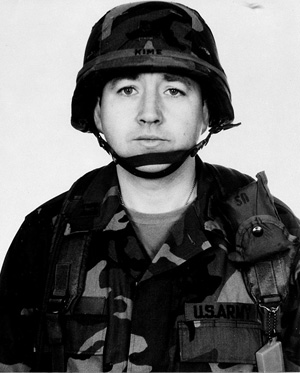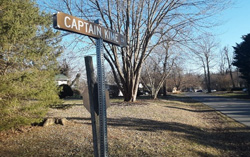
brother of Joseph Gordon Kime III

Remember...
Joseph Gordon Kime III
1952-1991
"May the sun in his course visit no land more free, more happy, more lovely, than this our own country!"
Senator Daniel Webster
Joseph Gordon Kime III was born in Bethesda, Maryland, on September 22, 1952. His parents were Joseph Gordon Kime Jr., from Indiana, and Gertrude (Trudy) Mary Cumberland Kime, wfrom Washington, D.C. Growing up he had one brother, Richard Allen Kime, and one sister, Patricia Ann Kime. Their father worked for the National Park Service after his service in the Marine Corps. They moved to Jackson Hole, Wyoming, where he worked at Grand Teton National Park. Joseph was a junior in high school when they moved to Wyoming and graduated from high school the following year. Joseph followed his father's footsteps, enlisted in the Marines, and completed his basic training at Parris Island, South Carolina, in 1970. He received an honorable discharge after his initial enlistment and resided with his parents in Cherokee, North Carolina, until 1974, when they moved to Charles Town, West Virginia.
Joseph decided to attended college at Western Carolina University located in Cullowhee, North Carolina. Utilizing the Montgomery GI Bill that he earned through the Marines, he was able to pay for his education and received his bachelor's degree in accounting in 1977. While attending college, Joseph met his wife, Elizabeth Neil. They had two children together, Nichole Kime and Joseph G. Kime IV. Several years later he was commissioned into the Army on March 11, 1982. His first duty station as a second lieutenant was at Fort Sill, Oklahoma. Since he was on active duty status, he kept his parents' address as his home of record. He would later be promoted to the rank of captain and be stationed in Germany toward the end of the Cold War. He was the assistant S4 of Headquarters, Headquarters Company 1st Brigade, 3rd Armored Division, in Kirchgoens, Germany. Some of the information regarding Capt. Kime's service can be found on the Find A Grave and Together We Served websites.
Many units in Germany were trained to defend against an invasion from Russia during this time, but never had to put their training to work due to the fall of the Berlin Wall in November of 1989. On December 3, 1989, President George H.W. Bush and Russian General Secretary Mikhail Gorbachev declared that the Cold War was over, but it would be a matter of time before Capt. Kime would be needed to serve in a wartime capacity. On August 2, 1990, the Iraqi Army invaded and occupied the country of Kuwait. Iraqi President Saddam Hussein claimed that Kuwait was the rightful land of his country. Iraq was in major debt due to its previous war with Iran and slumping oil production prices. Saddam Hussein had ambitions to take on Saudi Arabia and to eventually rule all of the Arabian Peninsula.
Within hours of the takeover of Kuwait, the United Nations officially condemned the invasion. On August 3, the Arab League passed its own resolution, which called for a solution to the conflict. After several talks to resolve the issue, the U.N. Security Council passed Resolution 678 on November 29, 1990. This resolution gave Iraq until January 15, 1991, to fully pull all their forces out of Kuwait without compromise. During this time, the U.S. military deployed ground troops, ships, and aircraft to prevent Saddam Hussain from invading Saudi Arabia and to prepare for war. A coalition consisting of 35 countries massed a buildup of almost one million troops, 700,000 of which were U.S. forces, massed around the area prior to the deadline for which Iraq was ordered to withdraw.
Capt. Kime's unit, along with all of the 3rd Armored Division, departed Germany and deployed to Saudi Arabia around December of 1990. Their mission was to position itself to the west of Kuwait and proceed north into Iraq as the ground war commenced. After 40 days of aerial bombardment, the ground war commenced on February 24, 1991. The 3rd Armored Division moved north into Iraq spearheaded by the 1st Armored Division. On February 26, they were tasked with clearing Objective Dorset, which was defended by Iraqi forces. By the end of the next day, the 3rd Armored Division cleared through the objective destroying over 800 enemy vehicles, decimating two Iraqi Republican Guard Divisions, and capturing over 3,000 prisoners of war (POWs). At the height of the battle, the 3rd Armored Division included 32 battalions and 20,533 personnel. It was the largest coalition division in the Gulf War and the largest U.S. Armored Division in history. In its moving arsenal were 360 x Abrams Main Battle Tanks, 340 x Bradley Fighting Vehicles, 128 x Self-Propelled 155 mm Howitzers, 27 x Apache Attack Helicopters, 9 x Multiple-Launch Rocket Systems (MLRS) and more.
On February 28, 1991, 100 hours after the ground conflict started, President Bush declared that Kuwait was liberated and ordered a ceasefire. All units stood down and waited for orders to redeploy back home. Capt. Kime's unit repositioned back into their staging area in Saudi Arabia and waited for orders to return home. During this time, a supply run was needed for the unit along the main supply route (MSR). Capt. Kime and his commander flipped a coin to decide who would lead the convoy. Capt. Kime lost and led a convoy to Kuwait City on March 11, 1991; ironically it was nine years to the day that he was commissioned into the Army. During the convoy, his HUMVEE hit a land mine that exploded, gravely injuring him. Shrapnel from the explosion was too extensive for him to recover, and he died of his wounds two days later on March 13, 1991, in Saudi Arabia.
The news of Captain Joseph G. Kime III's death reached his family in West Virginia when his mother was notified by the Army through a telephone call. Captain Kime was one of the 379 coalition deaths during the Gulf War, 145 of which were from non-hostile action. His wife and two children resided in Germany until the unit returned to Kirchgoens.
 Courtesy Richard Kime |
In 1993, Charles Town officially named the street where Joseph's parents lived as "Captain Kime Drive." |
After his son's death, Joseph Kime Jr., of Charles Town, West Virginia, said "[he] loved being in the U.S. Army. He was executive officer of a tank battalion." He grew up listening to his father's stories about his service in the U.S. Marines during the Korean War. Gertrude Kime said she worried when he was sent over to the Persian Gulf and was glued to the television watching the war unfold. "When President Bush said the war was over, my heart dropped," she said. The war ended on February 27, 1991.
The Captain Joseph G. Kime III Memorial Scholarship was established and is designated as a general academic award for veterans or children of veterans from Jefferson County, West Virginia, who attend Shepherd University. This endowment was established in part by "Freedom Lives" donations made in memory of Captain Joseph Kime III, the only Jefferson County casualty of the Persian Gulf War in 1991. ("Capt. Joseph G. Kime III Memorial Scholarship," Shepherd University Foundation, accessed 12 April 2019, https://shepherduniversityfoundation.org/search-named-funds/?cpage=5.)
Article prepared by SFC (Ret) Jonathan Normand, George Washington High School JROTC
April 2019

West Virginia Archives and History welcomes any additional information that can be provided about these veterans, including photographs, family names, letters and other relevant personal history.